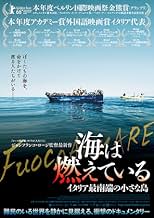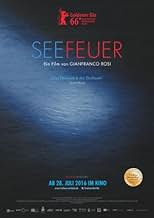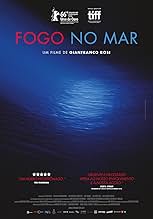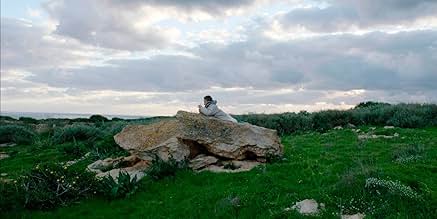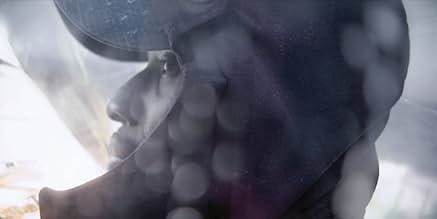Capturing life on the Italian island of Lampedusa, a frontline in the European migrant crisis.Capturing life on the Italian island of Lampedusa, a frontline in the European migrant crisis.Capturing life on the Italian island of Lampedusa, a frontline in the European migrant crisis.
- Director
- Writers
- Stars
- Nominated for 1 Oscar
- 16 wins & 28 nominations total
- Director
- Writers
- All cast & crew
- Production, box office & more at IMDbPro
Featured reviews
Documentary films can be known for have a harsh look given his nature of realism and objectivity, the visual element becomes secondary when it's Reality the substance of the discourse in the movie, and also having in mind the idea of the political possibilities that this tool offers is normal to think that aesthetics are not really relevant.
In this case, Fire at Sea achieves the perfect balance between both elements: Political statement or position from a very Objective point of view; and very beautiful visual development without affect to much the reality of happenings. We are talking about a spellbinding but bittersweet piece of work that it can really shock you both painfully and delightedly, it's captivating but thrilling at the same time a really must see feature.
Rosi's strength lies in his refusal to manipulate. He doesn't push an agenda, nor does he tell you what to feel. He trusts the images and the humanity within them to speak for themselves. There are moments of profound pain in the film: bodies pulled from the sea, testimonies of horror. Yet there is also space for silence, for breath, for dignity.
His lens lingers on faces, gestures, and sounds crafting a documentary that feels more like poetry than reportage. The island is shot with a restrained beauty: its landscapes are barren and windswept, its sea vast and unknowable. Even in scenes of suffering, Rosi avoids voyeurism, capturing instead a quiet reverence for human endurance.
What makes Fuocoammare remarkable is not only what it shows, but how it chooses to show it. Rosi's camera is never invasive, never exploitative. His sensitivity as a filmmaker lies in his ability to observe without intruding to witness suffering and resilience not with sensationalism, but with quiet, unwavering attention.
The film did show the comfortable orderly lives of the islanders and their comfortable homes, contrasting with the destitution of the migrants who have lost everything - their homes, jobs, family members and face an uncertain future after a hazardous and sometimes deadly journey, but other than the doctor, no one seemed particularly bothered.
Questions which were not answered, where are the migrants getting all the money for the journey, which seems to cost around $10,000 and more. Just the boat trip from Libya to Lampedusa costs between $1,500 and $850 depending on your place in the boat, and seeing as most of the migrants are from Central Africa, getting to Libya must cost ten times more. What are the smugglers doing with all their money which must run into hundreds of millions by now. Where is it being laundered. What is being done to catch the smugglers? Are the migrants really in peril and facing death, or are they being enticed by the people smugglers with false claims of a land of milk and honey. If the latter, why are they not writing (or phoning on the ubiquitous cell phones) to warn their friends and family not to come? Perhaps it is compassion fatigue, but as we saw the dead migrants being unloaded from the tiny overcrowded boat, I was reminded of the cry of 'Bring out your dead' in the days of the plague.
I felt right at the start that this is going to be great. The colors, the photography, the sound, everything lead to show me the harmony and the inner glow of Lampedusa and it's inhabitants, and the pragmatic, dramatic contrast of the migrants.
So much Charm. Wow! This movie is relaxes, shows drama in other ways...
Usually I don't even like slow films: with few cuts, few actions: But that one...blow me away.
It's like living there, essentially with them, feeling their emotions, the salty sea air on our skin... And I think this is mainly because of the "local actors". Rossi and the Cast made a ,,capolavoro" capturing and playing their life that way.
Congratulations!
Did you know
- TriviaDirector Gianfranco Rosi did his own cinematography again, but used for the first time an ARRI Amira camera, which he said allowed him to shoot in dark environments: "Sometimes it looked like we had an incredible amount of light. Technology helped me a lot on this film. Being able to work with this tiny camera by myself was an incredible tool." [2016]
- Quotes
Nigerian Refugee: This is my testimony... We could no longer stay in Nigeria. Many were dying. Most were bombed... We flee from Nigeria. We ran to the desert. We went Sahara Desert and many died... Raping and killing many people, and we could not stay. We flee to Libya. And Libya was a city of ISIS. And Libya was a place not to stay... On the journey on the sea, 200 passengers died. They got lost to the sea. A boat was carrying 90 passengers. Only 30 were rescued, and the rest died. Today we are alive...
- ConnectionsFeatured in Subject (2022)
- How long is Fire at Sea?Powered by Alexa
Details
- Release date
- Countries of origin
- Official sites
- Languages
- Also known as
- Fire at Sea
- Filming locations
- Production companies
- See more company credits at IMDbPro
Box office
- Gross US & Canada
- $120,933
- Gross worldwide
- $1,178,377
- Runtime
- 1h 54m(114 min)
- Color
- Sound mix
- Aspect ratio
- 1.85 : 1

![Watch Trailer [OV]](https://m.media-amazon.com/images/M/MV5BNmQ3ZjU0NzktZWFmNi00YzMxLTg1N2UtMGM3ZTgwMDU3OWJlXkEyXkFqcGdeQXRodW1ibmFpbC1pbml0aWFsaXplcg@@._V1_QL75_UX500_CR0)


